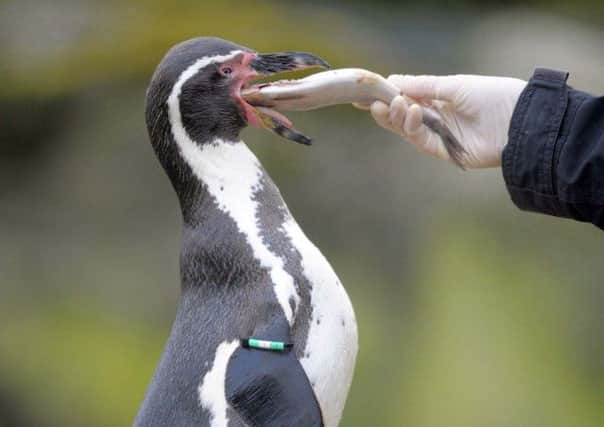P-pick up a paracetamol for poorly penguins


But even this has failed to fortify a colony of penguins against the impact of a harsh wet winter in Scarborough.
The South American seabirds are so jaded by the relentless rain and wind that their handlers have put them on anti-depressants.
Advertisement
Hide AdAdvertisement
Hide AdIt is the first time the 12 Humboldt penguins at Scarborough Sea Life Sanctuary have needed such medication since they were left severely stressed by a break-in at the attraction almost three years ago.
“Humboldts in the wild on the coast of Peru and Chile can be subjected to some pretty wild extremes of weather,” said display curator Lyndsey Crawford. “What they don’t get, though, is weeks of almost daily downpours and high winds.
“After the first week our birds were just a bit subdued, but after over a month now they are thoroughly fed-up and miserable, much like the rest of us.”
Misery can lower the body’s natural defences in penguins even more easily than in humans, and that is why the penguins have been prescribed ‘uppers’ to try and head off any more serious symptoms.
Advertisement
Hide AdAdvertisement
Hide Ad“They’re doing the trick so far, but we are all praying for the weather to change and at least a few successive days of sunshine to give the penguins the tonic they really need,” said Lyndsey.
Staff realised something was wrong when they spotted the penguins spending more and more time sulking in their private quarters at the rear of their enclosure.
Each penguin has its own plastic box, which visitors cannot see into, designed to afford them the privacy they get in the wild in a sand burrow or cave.
The penguins are fed four times a day but staff found they were throwing much of the fish away as the birds became more and more languid.
Advertisement
Hide AdAdvertisement
Hide AdThey were also seen hanging their heads and staring at the floor – another tell-tale sign of depression.
All the birds at the centre were born in captivity but because the species hails from the balmier climes of Peru and Chile, feeling the cold is in their genes.
In South America Humboldts bask in the warmth of a dry season nine months a year.
The rainy season, which coincides with British summer, only lasts for three months and is not as wet as our winter.
Advertisement
Hide AdAdvertisement
Hide AdDownpours tend to peter out after a couple of days rather than weeks, allowing the penguins to leave their burrows and caves to forage the ocean for fish.
Here all they can do is retire to their boxes to brood under the grey skies.
So it was decided to insert capsules of the sea bird antidepressant Sporanox into their heron and sprats twice a day.
The regime is planned to last a fortnight – but is already showing results, according to aquarist Josh Saunders.
Advertisement
Hide AdAdvertisement
Hide Ad“Now the medication has started to kick in they are starting to perk up and they are feeding really well,” he said.
“It’s hard to describe a miserable penguin.
“But they tend to hang their heads down facing the ground and just stand around rather than being active.”
After two weeks of dosing the penguins experts will study the birds in the third week to decide if they need to repeat the treatment.
All of the penguins have taken anti-depressants previously apart from a two-year-old and nine-month old.
Advertisement
Hide AdAdvertisement
Hide Ad“The older baby was around last winter but the weather was not as bad as this year,” said aquarist Amy Mcfarlan.
“We all get a bit glum as well, working in the wind and rain, but we can cope with lots of tea to make us feel better.”